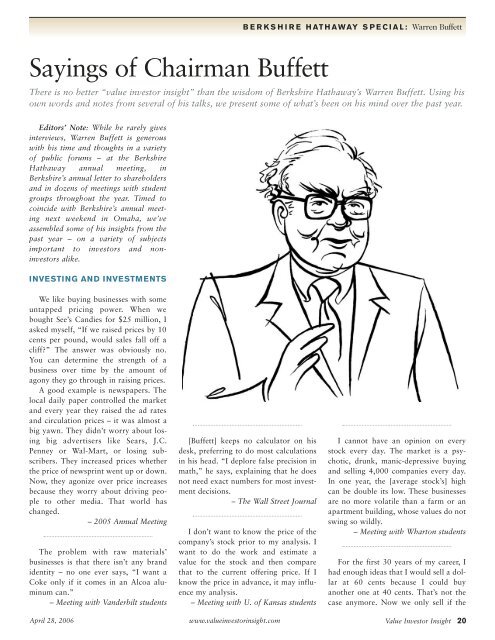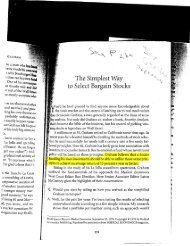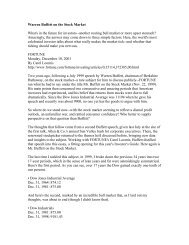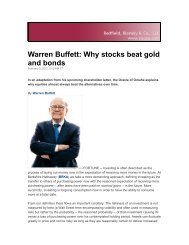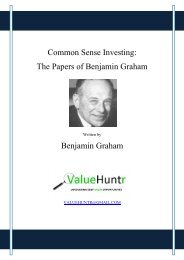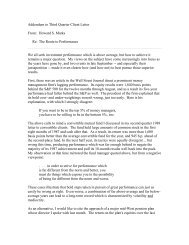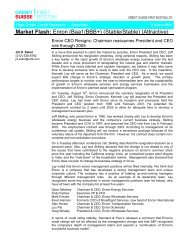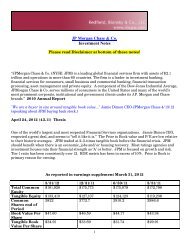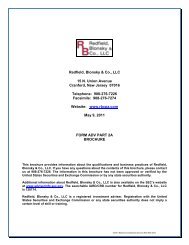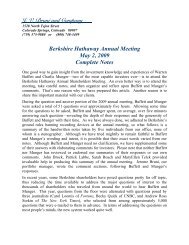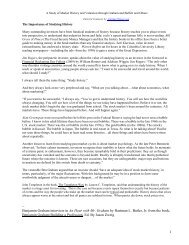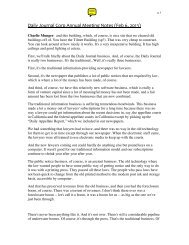You also want an ePaper? Increase the reach of your titles
YUMPU automatically turns print PDFs into web optimized ePapers that Google loves.
BERKSHIRE HATHAWAY SPECIAL: Warren <strong>Buffett</strong><br />
<strong>Sayings</strong> <strong>of</strong> <strong>Chairman</strong> <strong>Buffett</strong><br />
There is no better “value investor insight” than the wisdom <strong>of</strong> Berkshire Hathaway’s Warren <strong>Buffett</strong>. Using his<br />
own words and notes from several <strong>of</strong> his talks, we present some <strong>of</strong> what’s been on his mind over the past year.<br />
Editors’ Note: While he rarely gives<br />
interviews, Warren <strong>Buffett</strong> is generous<br />
with his time and thoughts in a variety<br />
<strong>of</strong> public forums – at the Berkshire<br />
Hathaway annual meeting, in<br />
Berkshire’s annual letter to shareholders<br />
and in dozens <strong>of</strong> meetings with student<br />
groups throughout the year. Timed to<br />
coincide with Berkshire’s annual meeting<br />
next weekend in Omaha, we’ve<br />
assembled some <strong>of</strong> his insights from the<br />
past year – on a variety <strong>of</strong> subjects<br />
important to investors and noninvestors<br />
alike.<br />
INVESTING AND INVESTMENTS<br />
We like buying businesses with some<br />
untapped pricing power. When we<br />
bought See’s Candies for $25 million, I<br />
asked myself, “If we raised prices by 10<br />
cents per pound, would sales fall <strong>of</strong>f a<br />
cliff” The answer was obviously no.<br />
You can determine the strength <strong>of</strong> a<br />
business over time by the amount <strong>of</strong><br />
agony they go through in raising prices.<br />
A good example is newspapers. The<br />
local daily paper controlled the market<br />
and every year they raised the ad rates<br />
and circulation prices – it was almost a<br />
big yawn. They didn’t worry about losing<br />
big advertisers like Sears, J.C.<br />
Penney or Wal-Mart, or losing subscribers.<br />
They increased prices whether<br />
the price <strong>of</strong> newsprint went up or down.<br />
Now, they agonize over price increases<br />
because they worry about driving people<br />
to other media. That world has<br />
changed.<br />
– 2005 Annual Meeting<br />
The problem with raw materials’<br />
businesses is that there isn’t any brand<br />
identity – no one ever says, “I want a<br />
Coke only if it comes in an Alcoa aluminum<br />
can.”<br />
– Meeting with Vanderbilt students<br />
April 28, 2006<br />
[<strong>Buffett</strong>] keeps no calculator on his<br />
desk, preferring to do most calculations<br />
in his head. “I deplore false precision in<br />
math,” he says, explaining that he does<br />
not need exact numbers for most investment<br />
decisions.<br />
– The Wall Street Journal<br />
I don’t want to know the price <strong>of</strong> the<br />
company’s stock prior to my analysis. I<br />
want to do the work and estimate a<br />
value for the stock and then compare<br />
that to the current <strong>of</strong>fering price. If I<br />
know the price in advance, it may influence<br />
my analysis.<br />
– Meeting with U. <strong>of</strong> Kansas students<br />
www.valueinvestorinsight.com<br />
I cannot have an opinion on every<br />
stock every day. The market is a psychotic,<br />
drunk, manic-depressive buying<br />
and selling 4,000 companies every day.<br />
In one year, the [average stock’s] high<br />
can be double its low. These businesses<br />
are no more volatile than a farm or an<br />
apartment building, whose values do not<br />
swing so wildly.<br />
– Meeting with Wharton students<br />
For the first 30 years <strong>of</strong> my career, I<br />
had enough ideas that I would sell a dollar<br />
at 60 cents because I could buy<br />
another one at 40 cents. That’s not the<br />
case anymore. Now we only sell if the<br />
Value Investor Insight 20
BERKSHIRE SPECIAL<br />
business has changed or we don’t trust<br />
management. I would not manage $150<br />
million like this.<br />
– Meeting with Wharton students<br />
If you’re smart, you don’t need leverage.<br />
If you’re dumb, you have no business<br />
using it.<br />
– Meeting with Wharton students<br />
Long ago, Sir Isaac Newton gave us<br />
three laws <strong>of</strong> motion, which were the<br />
work <strong>of</strong> genius. But Sir Isaac’s talents<br />
didn’t extend to investing: He lost a bundle<br />
in the South Sea bubble, explaining<br />
later, “I can calculate the movement <strong>of</strong><br />
the stars, but not the madness <strong>of</strong> men.”<br />
If he had not been traumatized by this<br />
loss, Sir Isaac might well have gone on to<br />
discover the Fourth Law <strong>of</strong> Motion: For<br />
investors, as a whole, returns decrease as<br />
motion increases.<br />
– 2005 Annual Report<br />
The enemy <strong>of</strong> investment success is<br />
activity. I know the American investor<br />
will not be better <strong>of</strong>f if volume doubles<br />
on the New York Stock Exchange, and I<br />
also know [a publicly-traded] NYSE will<br />
be trying to figure out how to do that if<br />
it is trying to maximize its own earnings<br />
per share.<br />
– 2005 Annual Meeting<br />
My broker at Citigroup told me to<br />
look through this Korean version <strong>of</strong> the<br />
Moody’s guide – that it would look just<br />
like [the United States in] 1951, and he<br />
was right. In six hours I put together a<br />
small portfolio <strong>of</strong> 20-25 stocks, about<br />
$100 million total.<br />
One example was Daehan Flour<br />
Mills. It has a 25% market share in<br />
wheat flour in South Korea. Book value<br />
was 206,000 Won, the company had<br />
201,000 Won in marketable securities<br />
and it was trading at 2x earnings.<br />
Markets are clearly not efficient all <strong>of</strong><br />
the time.<br />
– Meeting with U. <strong>of</strong> Kansas students<br />
April 28, 2006<br />
Berkshire Hathaway invested in<br />
PetroChina because it was cheap, not<br />
because it was “China.”<br />
– Meeting with U.C.L.A. students<br />
MANAGERS AND MANAGING<br />
We haven’t tried to evaluate, before<br />
they have a record, who will be superstar<br />
managers. Instead, we find people who<br />
have batted .350 for 10 to 50 years. We<br />
just assume we won’t screw it up by hiring<br />
them. We take people who play the<br />
game very well and allow them to play.<br />
– 2005 Annual Meeting<br />
We look for three things [in our managers]:<br />
intelligence, energy and integrity.<br />
If they don’t have the latter, then you<br />
should hope they don’t have the first two<br />
either. If someone doesn’t have integrity,<br />
then you want him to be dumb and lazy.<br />
– 2005 Annual Meeting<br />
I do not hire people I would not want<br />
as friends or as neighbors. I work with<br />
people who make my life easier. You<br />
can’t work with people who make your<br />
stomach grind.<br />
– Meeting with Wharton students<br />
A friend <strong>of</strong> mine spent twenty years<br />
looking for the perfect woman; unfortunately,<br />
when he found her he discovered<br />
that she was looking for the perfect man.<br />
– Meeting with Dartmouth students<br />
Too <strong>of</strong>ten, executive compensation in<br />
the United States is ridiculously out <strong>of</strong><br />
line with performance. That won’t<br />
change, moreover, because the deck is<br />
stacked against investors when it comes<br />
to the CEO’s pay. The upshot is that a<br />
mediocre-or-worse CEO – aided by his<br />
handpicked VP <strong>of</strong> human relations and a<br />
consultant from the ever-accommodating<br />
firm <strong>of</strong> Rachet, Ratchet and Bingo –<br />
all too <strong>of</strong>ten receives gobs <strong>of</strong> money<br />
from an ill-designed compensation<br />
agreement.<br />
www.valueinvestorinsight.com<br />
Getting fired can produce a particularly<br />
bountiful payday for a CEO.<br />
Indeed, he can “earn” more in that single<br />
day, while cleaning out his desk, than<br />
an American worker earns in a lifetime<br />
<strong>of</strong> cleaning toilets. Forget the old maxim<br />
about nothing succeeding like success:<br />
Today, in the executive suite, the all-tooprevalent<br />
rule is that nothing succeeds<br />
like failure.<br />
– 2005 Annual Meeting<br />
BERKSHIRE HATHAWAY<br />
Every day, in countless ways, the competitive<br />
position <strong>of</strong> each <strong>of</strong> our businesses<br />
grows either weaker or stronger. If we are<br />
delighting customers, eliminating unnecessary<br />
costs and improving our products<br />
and services, we gain strength. But if we<br />
treat customers with indifference or tolerate<br />
bloat, our businesses will wither.<br />
– 2005 Annual Report<br />
[W]e have three managers at Berkshire<br />
who are reasonably young and fully capable<br />
<strong>of</strong> being CEO. Any <strong>of</strong> the three would<br />
be much better at certain management<br />
aspects <strong>of</strong> my job than I. On the minus<br />
side, none has my crossover experience<br />
that allows me to be comfortable making<br />
decisions in either the business arena or in<br />
investments. That problem will be solved<br />
by having another person in the organization<br />
handle marketable securities. That’s<br />
an interesting job at Berkshire, and the<br />
new CEO will have no problem in hiring<br />
a talented individual to do it.<br />
– 2005 Annual Report<br />
Was this onslaught <strong>of</strong> more frequent<br />
and more intense storms merely an anomaly<br />
Or was it caused by changes in climate,<br />
water temperature or other variables<br />
we don’t fully understand And<br />
could these factors be developing in a<br />
manner that will soon produce disasters<br />
dwarfing Katrina<br />
Joe [Brandon], Ajit [Jain] and I don’t<br />
know the answer to these all-important<br />
questions. What we do know is that our<br />
Value Investor Insight 21
BERKSHIRE SPECIAL<br />
ignorance means we must follow the<br />
course prescribed by Pascal in his famous<br />
wager about the existence <strong>of</strong> God. As you<br />
may recall, he concluded that since he<br />
didn’t know the answer, his personal<br />
gain/loss ratio dictated an affirmative<br />
conclusion. So guided, we’ve concluded<br />
that we should now write mega-cat policies<br />
only at prices far higher than prevailed<br />
last year – and then only with an<br />
aggregate exposure that would not cause<br />
us distress if shifts in some important<br />
variable produce far more costly storms<br />
in the near future.<br />
– 2005 Annual Report<br />
We don’t think the way homes are<br />
bought and sold will change very much.<br />
Some will disagree, but we don’t think the<br />
Internet will change this. [Buying and selling<br />
a home] is the biggest financial decision<br />
most people will make and people<br />
will continue to want to have a one-onone<br />
relationship with a real estate broker.<br />
- 2005 Annual Meeting<br />
POLITICS AND POLICY<br />
We’re like an incredibly rich family.<br />
We sit on the porch <strong>of</strong> our huge farm – so<br />
big that we can’t even see the end <strong>of</strong> it –<br />
and each year, we consume 6% more than<br />
the farm produces. To pay for this, each<br />
year we sell or mortgage a little bit <strong>of</strong> the<br />
farm that we can’t see, so we don’t even<br />
notice. We’re very, very rich and the rest<br />
<strong>of</strong> the world is happy to buy from us or<br />
lend to us, so each year they take a piece<br />
<strong>of</strong> our valuable assets – and they work<br />
very hard. But we will have to service<br />
this. If it goes on for a long time, our children<br />
will pay.<br />
– 2005 Annual Meeting<br />
I’m concerned about our political leadership,<br />
but as Peter Lynch once said,<br />
“Invest in businesses any idiot could run,<br />
because someday one will.” We’ve had<br />
many bad Presidents, but have still done<br />
well. Real GDP per capita rose seven-fold<br />
in the last century, which is remarkable.<br />
– 2005 Annual Meeting<br />
April 28, 2006<br />
It would not be easy to implement, but<br />
some form <strong>of</strong> a steeply progressive consumption<br />
tax for the wealthy makes a lot<br />
<strong>of</strong> sense to me. For instance, when I fly<br />
my private jet, I use hundreds <strong>of</strong> gallons<br />
<strong>of</strong> jet fuel but I'm not taxed at a higher<br />
rate. Flying in a private jet is usually<br />
unnecessary, excessive consumption and I<br />
should be taxed appropriately via a higher<br />
consumption tax.<br />
– Meeting with Dartmouth students<br />
Next to the nuclear/chemical/biological<br />
weapon problem, the #1 problem we<br />
face is making sure our educational system<br />
is providing a good education to all<br />
children – and it’s not. A big problem is<br />
that in many places, the rich have opted<br />
out. I imagine that if I used the local golf<br />
courses, I’d care a lot about how they<br />
were managed and maintained. It’s the<br />
same with schools. There’s a two-tiered<br />
system right now.<br />
– 2005 Annual Meeting<br />
Terrorism, it seems to me, is impossible<br />
to solve because there will always be<br />
troubled people seeking to do harm to<br />
large masses <strong>of</strong> people. The intent is surely<br />
there and knowledge <strong>of</strong> how to inflict<br />
terror is spreading. If you have intent and<br />
knowledge, the third aspect <strong>of</strong> terrorism<br />
is ‘materials and deliverability.’ This is<br />
harder to come by for the terrorists and<br />
what we should be working to prevent. If<br />
I knew we could devise a solution to terrorism,<br />
I would dedicate 100% <strong>of</strong> my<br />
foundation's funds to this effort, but I'm<br />
just not sure there's a solution.<br />
– Meeting with Dartmouth students<br />
CHARITABLE GIVING<br />
One principle is to address very important<br />
societal problems that do not have a<br />
constituency – ideas that are politically<br />
unpopular. For example, John Rockefeller<br />
supported black colleges, something no<br />
one wanted to touch. They had no wealthy<br />
alumni, so Rockefeller said, “I’ll be the<br />
alumni.” That’s the kind <strong>of</strong> thing I like.<br />
– Meeting with Wharton students<br />
www.valueinvestorinsight.com<br />
Doing charity work is the opposite <strong>of</strong><br />
investing – we look for the most difficult<br />
problem to solve and the ones that have<br />
the lowest probability <strong>of</strong> success.<br />
– Meeting with Vanderbilt students<br />
It’s interesting that the same people who<br />
talk about the terrible cycle <strong>of</strong> dependency<br />
that welfare brings will then hand their<br />
kids when they emerge from the womb a<br />
lifetime supply <strong>of</strong> food stamps. But some<br />
poor woman who’s had two pregnancies<br />
by the time she’s 17, they say, “Oh, this is<br />
terrible to give her anything.”<br />
– Fortune interview<br />
[Y]ou can argue that a very significant<br />
percentage <strong>of</strong> [my] money has been made.<br />
And I don't need the stock to control<br />
Berkshire, so it may make sense to do<br />
something very significant [charity-wise]<br />
before I die.<br />
– Fortune interview<br />
LIFE LESSONS<br />
The meaning <strong>of</strong> life is to do everything<br />
you can to make sure the people you care<br />
about love you back.<br />
– Meeting with Dartmouth students<br />
You’re changed most by your interactions<br />
with your spouse. Who your spouse<br />
is hugely affects your life and some people<br />
make mistakes.<br />
– Meeting with Wharton students<br />
An example is the best thing you can<br />
leave behind. Obviously, you want to<br />
leave the right example. I mean, Wilt<br />
Chamberlain's tombstone may say, “At<br />
last, I sleep alone,” and that's probably<br />
not the example you want to leave. If<br />
what I've done with Berkshire – running<br />
a unique and independent company in<br />
true pursuit <strong>of</strong> shareholder value – persists<br />
and people learn from it to improve<br />
the way they invest and run their companies,<br />
that would be a fine legacy to leave.<br />
– Meeting with Dartmouth students<br />
Value Investor Insight 22


